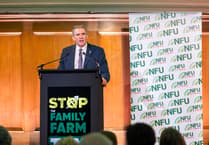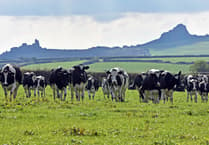Farming unions have cautiously welcomed the ‘reset’ agreement between the United Kingdom and the European Union.
As part of the agreement, the UK Government states it has secured improved trading rights for food and agricultural products into the EU.
These include a new agreement that will make it easier for food and drink to be imported and exported by reducing red tape and the removal of some routine checks on animal and plant products.
Prime Minister Keir Starmer says the new agreement would make food and agricultural trade with the EU cheaper and easier and could lower food prices and increase choice on supermarket shelves.
FUW President, Ian Rickman said: “The efforts made by the UK Government to restore relations with our nearest trading partners have to be welcomed. The EU remains the largest export market for Welsh agri-food exports despite the bureaucratic disruption and red tape caused by Brexit.
“The long-term security of the EU market for the trading of agri-food products should not be underestimated given the current volatility of global markets amid tensions over tariffs.
“The FUW has consistently raised its serious concerns regarding the failures of the UK Government to introduce effective border checks on EU food imports entering the UK. As such, this agreement should open the door to ensuring that both food imports and exports are subject to similar controls which not only provides a level playing field between UK and EU producers.”
NFU Cymru President Aled Jones, said: “Since 1 January 2021, the EU has applied third-country customs and border controls to UK agri-food exports, including documentary and physical checks, with UK exporters of products of animal origin including meat and dairy, needing vets to inspect individual export consignments and sign Export Health Certificates.
“If we consider the volume of products moving into the EU from the UK since 2019, then these show a significant decline. Exports of meat and meat preparations have reduced by 33%, whilst dairy products and eggs have fallen by 20%.
“Although there are multiple contributing factors to these drops, new trade frictions under the post-Brexit EU-UK trade relationship are likely to be an important driver of these falls, and that is why we have to do what we reasonably can to reduce and dismantle these barriers to trade.”
Although encouraged by today’s news, Mr Jones did sound a note of caution saying: “Whilst today’s positive news should mean that in future our goods will be able to reach the markets of the EU 27 without the current costs and complexities which undoubtedly have impeded trade flows, we have always argued that trade with the EU must be based on equivalency.
“Despite the benefits this deal brings, full dynamic alignment comes at a significant cost of committing to future EU rules, in which we will have little say. There remain important questions about what is within the scope of this agreement and, where current rules and regulations do differ, if there will be any exclusions.”





Comments
This article has no comments yet. Be the first to leave a comment.